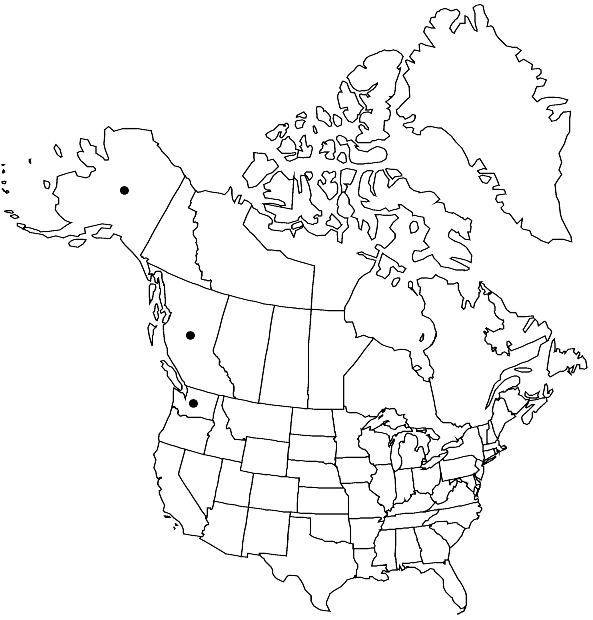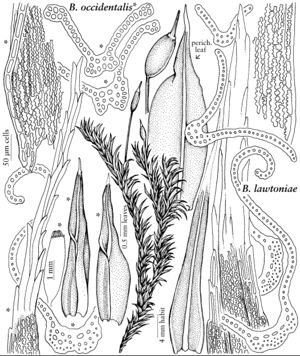Bucklandiella lawtoniae
in R. Ochyra et al., Cens. Cat. Polish Mosses, 145. 2003 (as lawtonae),.
Plants rather robust or less often moderately sized, loosely tufted, coarse and rigid, slightly glistening, yellow, yellow-green, olivaceous, sometimes grayish, in the upper part, brown proximally. Stems 5–10 (–15) cm, curved-ascending to erect, simple or sparingly, irregularly branched. Leaves erect-appressed to falcate-secund when dry, erect-spreading when wet, straight or curved, sometimes almost circinate, (3.5–) 4–5.5 (–6) × (0.5–) 0.6–0.8 (–0.9) mm; margins broadly recurved on one side and more narrowly on the other side to 1/3–1/2 (–3/4) of the leaf length, 1-stratose throughout or seldom with some bistratose patches distally; pilose, awns hyaline, not flexuose, erect-recurved to squarrose, 0.4–1.5 (–2.6) mm, rarely almost absent, flattened, with a distinct cell areolation, remotely sharply denticulate at the margins, distinctly decurrent; costa percurrent, strongly convex abaxially, reniform in the median and proximal portions, 75–100 (–115) µm wide basally, 40–50 µm wide distally, 3 (–5) -stratose basally with (3–) 4–5 enlarged adaxial cells, 2 (–3) -stratose distally, with 2–3 (–4) enlarged adaxial cells; laminal cells 1-stratose throughout, smooth; basal laminal cells elongate, 25–55 × 9–11 µm, with incrassate, sinuose-nodulose lateral walls; alar cells not or slightly differentiated, sometimes slightly yellowish; supra-alar cells hardly differentiated, not forming a distinct basal marginal border; medial and distal cells rectangular, 12–35 × 5–7 µm. Inner perichaetial leaves (2–3) broadly ovate, convolute, yellowish haline, shortly obtusely pointed or pilose, with thick-walled, chlorophyllose distal cells. Seta 4.5–7.5 mm, straight, brown, twisted clockwise. Capsule obloid to short-cylindric, (1.2–) 1.5–2.5 × 0.6–0.8 mm; operculum rostrate, straight, 1–1.5 mm; peristome teeth 250–480 µm, brown, deeply cleft into to branches, strongly papillose, erect. Spores 12–17 µm, granulose.
Habitat: Humid or wet, mostly shaded acidic rocks, boulders, cliffs and rock outcrops near streams and waterfalls
Elevation: low to moderate elevations (0-800 m)
Distribution

B.C., Alaska, Wash.
Discussion
Bucklandiella lawtoniae occurs along the coastal region from Kodiak Island and southern Alaska southwards to the Cascade Range in central Washington, with a highly isolated site on Attu Island in the Aleutians. The largest species of the genus, it can be recognized by its characteristic, long and not flexuose, erect-recurved to squarrose, hyaline awns that are distinctly decurrent. Some elongate and pilose plants of B. affinis may imitate B. lawtoniae but that species, apart from a number of differences in structural characters including the hyaline innermost perichaetial leaves, has erect-flexuose awns and leaf margins recurved on both sides towards the apex. The same differences exist between B. lawtoniae and B. heterosticha, in which, additionally, the costa is usually broad, 2-stratose, and canaliculate in the middle and distal parts of the leaf. Additional diagnostic characters of B. lawtoniae are undifferentiated alar cells and the absence of both a basal marginal border and a basal membrane in the peristome. The species appears to be strongly isolated in the genus and on account of its peculiar innermost perichaetial leaves it is positioned in a separate section.
Selected References
Lower Taxa
"-stratose" is not declared as a valid unit of measurement for this property."/3-1/2-3/4" is not declared as a valid unit of measurement for this property.
